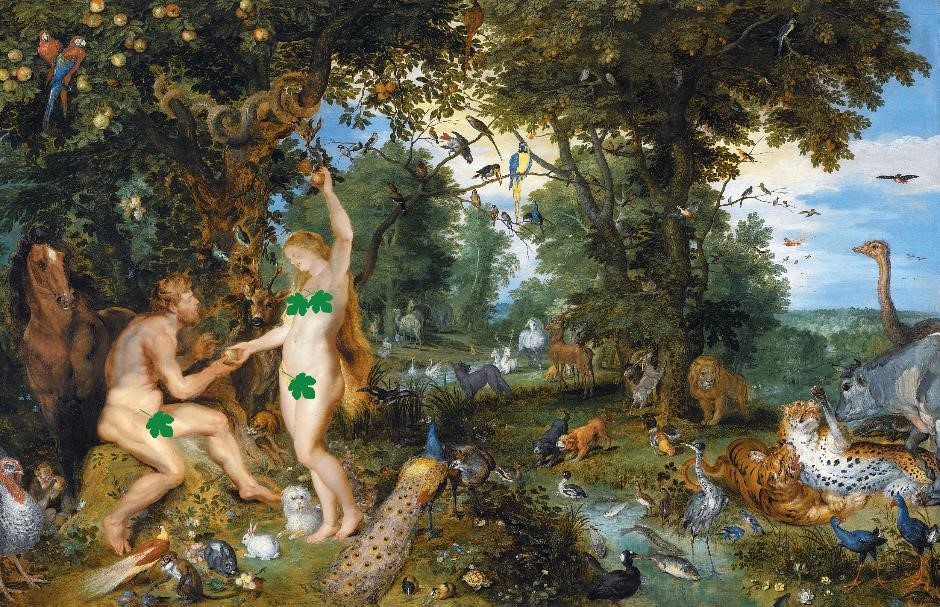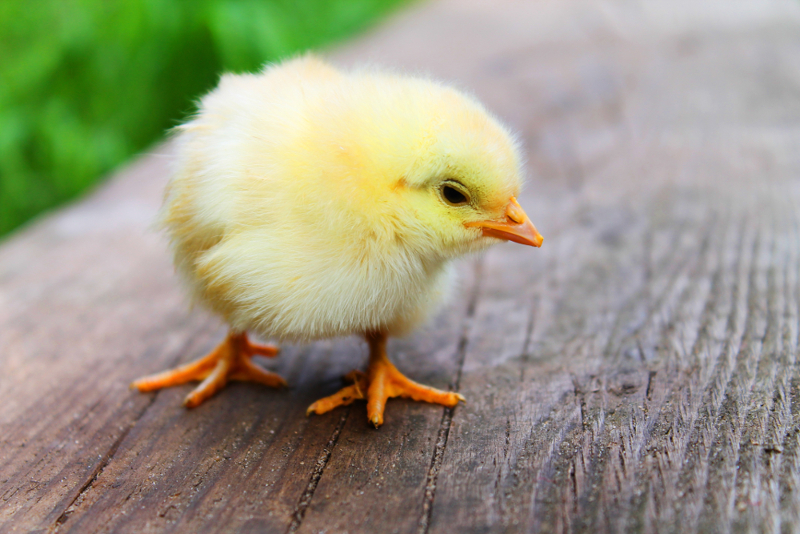The first eggs ever laid definitely didn't involve chickens. But this means that a non-chicken laid a chicken egg...that’s crazy! After reading the Bible you might think chickens came first because God created chickens. But the Bible can be read in different ways...
Did the chicken come before the egg?
Could it be possible that the first chicken didn’t come from a chicken egg?
This video suggests that at some point, some almost-chicken creature produced an egg containing a bird whose genetic makeup, due to some small mutation, was fully chicken.
Some people believe that all animals were created by God and that the Bible makes it clear that the chicken came first - but does it really say that?
Some people believe that all animals were created by God and that the Bible makes it clear that the chicken came first - but does it really say that?
So who won the race?
Chapter 1 of Genesis (the first book of the Bible) is a poetic song- thought to have been written by the prophet Moses. It shares a story of how the Earth came about which includes the creation of Heaven, light, the seas, the sky, animals and finally the first man and woman. The first mention of our feathery friends (or ‘fowls’ as they’re more generally known in the Bible) comes in verse 20. It says ‘Let ...fowl that may fly above the earth in the open firmament of heaven.’ In other words, ‘let birds fly freely in the sky’.
Shortly after (in verse 21) we hear how chickens and other birds and animals are actually created:
21 And God created great whales, and every living creature that moveth, which the waters brought forth abundantly, after their kind, and every winged fowl after his kind: and God saw that it was good.
Now returning to our Big Question, this suggests that chickens were the front runners! But it’s not quite that simple. This is because many researchers say that Genesis and the Bible in general, is a story. It has characters and they do things that we might not understand but that’s okay. Since when we read on, we learn more about them which helps us get a picture of why they act as they do.
Many Philosophers and Theologians think we should treat the Bible like a piece of literature in which we’re offered a series of images. It’s up to us - the reader - to translate these and relate them to our lives.
In the case of Genesis, before there’s mention of birds, we hear how on the third day God created grass and trees which all came from seeds. Now if we took seeds to be a metaphor for something deeper, the seeds could represent eggs and the beginning of new life. Ancient Theologian, Augustine (354-430 AD) suggested that lines like these in Genesis, portray God to be more of a gardener rather than a watch-maker. He sows seeds then lets them grow and naturally flourish by themselves. God doesn’t necessarily have a final design in mind nor create the final product.

Spot the chicken! ‘The Garden of Eden with the Fall of Man’ (1615) - painting by Jan Brueghel the Elder and Pieter Paul Rubens
And so considering this, you might argue that God created eggs first as well as a safe environment for them to develop (warmth, shelter etc.), and it was after this that chickens naturally came about. But this is just one of many ways of looking at it. This would’ve likely got the thumbs up from Biologist Charles Darwin (1809-1882) though. He famously argued that all the different types (species) of animals, trees and plants evolved from simple life forms and have changed over time to adapt to their environment.
So what does this all mean? What’s the best way to read the Bible?
Firstly, there’s no ‘best’ way- it’s open to us to find our own meaning(s). Also, it’s important to remember that the Bible was written many, many years ago in times historically and culturally different from what we know today. Plus, French Theologian, John Calvin (1509-1564) explained that the Bible is not a biology, geography or astrology textbook and so we should avoid trying to read it as one. Besides it’s not a surprise or worry that there are several things that are unclear in the Bible as- according to Calvin – God simplifies his account of how he created the world so that we might have some chance of understanding it. We cannot be expected to understand everything that God knows (‘divine wisdom’). And so the Bible explains things in simpler terms- a bit like a parent explaining something complicated to a child.
For this reason, many Theologians and Philosophers suggest that we should avoid taking everything written in the Bible literally. In the past, this has got some people into trouble such as Bishop Ussher (1581- 1656) who tried to work out an exact timeline of when God made the Universe. From his calculations, he believed that God started his work on the world on the evening of Sunday 23rd October 4004 BC!
Ussher’s work inspired several Geologists to research how old the Earth is- some with the aim of disproving this idea that it was created in 6 days. Such expeditions really frustrated many people who thought that we should read the Bible in a more open minded way. Artist, John Ruskin (1819-1900) famously said:
“If only the Geologists would let me alone, I could do very well, but those dreadful Hammers! I hear the clink of them at the end of every cadence of the Bible verses”
So bringing us back to our Big Question, it’s not entirely clear in the Bible who came first: the chicken or the egg. Instead, it’s up to us to carefully develop our own interpretation. What do you think?
This article was developed in discussion with Chris Oldfield, Kings College London.
But what have the great philosophers of our time said about this?
But what have the great philosophers of our time said about this?

Let’s imagine some of the most famous philosophers - Plato, Aristotle, Hegel and Marx - walk into a bar. They order their drinks and just as they’re sitting themselves down, the bar attendant says, “Right- none of you are leaving till you settle this question - what came first, the chicken or the egg?”
Our philosophers could be stuck there a very long time! For the question of how we and the world came into being has puzzled people for as long as our planet has had people living on it. Can they solve it for us? Let’s hope there’s plenty of snacks to keep them going!
We tend to focus on the chicken and egg argument because eggs have a deep significance for us. We all came from eggs.
They represent new life, new beginnings. And on Twitter, if you don’t have your own personal picture, you’re referred to as having an “egg” instead.
Dr Sebastian Gertz teaches philosophy at the University of Oxford and explains that chickens have probably existed for as long as we have.
They just weren’t a source of food for humans like they are today, they were simply another bird. It was only when it was realised that they can provide another source of protein within our diets, that humans started to rear chickens and eventually breed them on a large scale.

Dr Gertz explains that “The ancient Greek philosopher Plato (born in 428 BC) would say our universe is the best universe there is, which is why it has chickens in it! For Plato, it was a cosmic intellect [a powerful creator], which made the world and tried to make everything as good as it can possibly be. In Plato’s philosophy, there was a big sludge that existed before the universe was created and craftsmen shaped it into our world”.
“Plato’s pupil, Aristotle said whatever created the universe continues to create it. But because our world is is very far from perfect that means the creator is doing the same thing over and over again. It doesn’t change from one day to another.”
According to Plato and Aristotle, there was a kind of gloopy soup until something clever and powerful came along and ordered the universe into the system it is today.
Why are we so fascinated to know?
“Humans need explanations. Most of us have asked at some point, ‘How did we get here? How did it all start?’ We find it hard to grasp the beginning of the universe because what came before that? And before that and so on. We need stories to help us make sense of the world,” adds Dr Gertz.
The more ‘recent’ German philosophers, Hegel and Marx believed the world is always progressing. But for them, it’s not a smooth journey. There is conflict and struggle before things are resolved.
Hegel and Marx are known as "progressive philosophers” because they thought each new beginning represents an advance over the previous one. So the world is always getting better, even when it sometimes takes a backward step, such as in wars.
Marx built upon Hegel’s view. He said the way most of the world organises money, work and buying goods is bound to fall apart because it’s very unfair as some people do a lot better than others.
Some are very rich while many starve or have to live on very little despite working very hard. This is called ‘Capitalism’ and Marx said it would eventually be replaced by a new system called ‘Socialism’ where everyone gets a fair share.
Though he wrote this 150 years ago, his views are still hotly argued over today.
“Humans need explanations. Most of us have asked at some point, ‘How did we get here? How did it all start?’ We find it hard to grasp the beginning of the universe because what came before that?
It helps to think about what was going on when Hegel and Marx were writing. How were their lives different from ours?
Hegel was writing around the time of the French Revolution which began in 1789. Marx, born in 1818, studied Hegel’s teachings at college and produced his work after the first industrial revolution in Britain. So it’s likely both were heavily influenced by the huge changes going on around them and tried to find explanations.
We are again living in a time of great upheaval for which many of us want answers.
”Some philosophers think everything in life is already set. So there’s no room for chance. Nowadays, philosophers tend to be more cautious. They recognise we might not be able to predict things absolutely. The world does seem less predictable at the moment,” says Dr Gertz.
So back to our philosophers shut up in that bar...
Can they give us an answer to what came first?
“The idea that life is just random and much of what happens is just down to chance isn’t something the Greek philosophers believed,” Dr Gertz points out. "For them, it was all designed by a superior being which gave us chickens AND eggs.”
This explanation is quite close to many religious ones too.
If a scientist walked into that bar they might argue that the universe came about from things banging together - the big bang theory. This still doesn’t answer what came before that though!
Perhaps we can’t ever really know? - which is why we sometimes turn to philosophers. We want answers but what philosophy offers is stories. They aren’t meant to be taken literally. They give us pictures in our head. A kind of, 'this is what might’ve happened'.
Perhaps, in the end, it just boils down to which story do you like best and which makes most sense to you?
Chickens are the closest living relative to the T. Rex, though perhaps not quite as scary!
Chickens are dinosaurs!
Prof. Greger Larson (School of Archaeology, the University of Oxford) and Dr Holly Miller (University of Nottingham) discuss the link between dinosaurs and chickens, and how modern scientists and farmers are trying to selectively breed chickens so that they're more like their leaner, hardier ancestors.
Enough about chickens...what about us?
Drs Suzannah Williams and Dagan Wells explore the secrets and processes behind human fertilisation. Sperm and eggs must face huge challenges before they even meet. After fertilisation, they go on to form a small ball of cells with huge potential.
Did the chicken come before the egg?
-
It’s all in the protein
Research suggests that the protein essential for the formation of chicken eggs, called OV-17 is only found in chicken ovaries. Without it the chicken eggshell could not be formed. So without a chicken, you technically cannot get a chicken egg. A likely scenario is that some early egg-laying species gradually (through the process of evolution) lead to the creation of a bird similar to a chicken (call it a proto-chicken) which laid proto-chicken eggs. In one of these eggs, there was a mutation causing a slight change and selective advantage that made it the first chicken which then went on to lay chicken eggs.
-
Reptiles came first!
Egg-laying animals existed far before chickens, so technically the egg came before the chicken. In fact, the first reptile egg also came before the first dinosaur egg. The oldest known dinosaur egg came from the Early Jurassic period, about 190 million years ago. The earliest known reptile egg fossils are from a similar time, although there’s a reptile eggshell fossil claimed to be 250-300 million years old. The evolution of the amniotic egg – an egg with a shell and membranes around the embryo - around 320 million years ago means that reptiles were able to come onto land because their eggs were protected.
-
In the beginning God created… chickens!
Chapter 1 of Genesis (the first book of the Bible) shares a story of how the Earth came about which includes the creation of Heaven, light, the seas, the sky, animals and finally the first man and woman. The first mention of our feathery friends (or ‘fowls’ as they’re more generally known in the Bible) comes in verse 20. It says ‘Let ...fowl that may fly above the earth in the open firmament of heaven.’ In other words, ‘let birds fly freely in the sky’. This suggests that chickens were the front runners!
-
God is a gardener
Many researchers say that the Bible is like a story. In Genesis, on the third day, God created grass and trees which came from seeds. If we took seeds to be a metaphor, they could represent eggs and the beginning of new life. Ancient Theologian, Augustine (354-430 AD) suggested that this portrays God as a gardener rather than a watchmaker. He sows seeds then lets them grow by themselves. Considering this, you might argue that God created eggs first as a safe environment for birds to develop (warmth, shelter etc.), and after this chickens naturally came about.
-
Chickens beat eggs!
Dr. Sebastian Gertz (University of Oxford) explained that “The ancient Greek philosopher Plato (born 428 BC) would say our universe is the best universe there is, which is why it has chickens in it! For Plato, it was a cosmic intellect [a powerful creator], which made the world and tried to make everything as good as it can possibly be. In Plato’s philosophy, there was a big sludge that existed before the universe was created and craftsmen shaped it into a world.” Wouldn’t it make sense for the craftsmen to have shaped the chicken first, who could then lay lots of eggs?
-
Mutated chicken eggs
During reproduction, two organisms pass along their genetic information in the form of DNA. But the replication of this DNA is never one hundred percent accurate and often produces minor changes in the new organism. These small mutations in DNA over thousands of generations create new species. But these genetic mutations must occur in the zygote or initial cell, so a creature very similar to a chicken (which we could call a proto-chicken) would have mated with another proto-chicken and because of a small genetic mutation created the first chicken, which grew in a chicken egg.